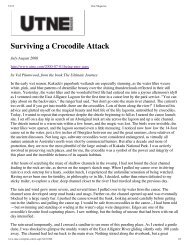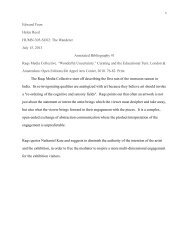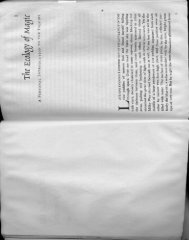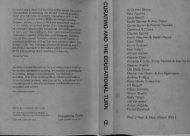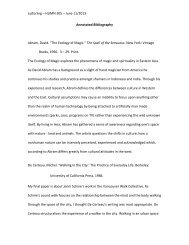Applying to the Exchange Program
Applying to the Exchange Program
Applying to the Exchange Program
You also want an ePaper? Increase the reach of your titles
YUMPU automatically turns print PDFs into web optimized ePapers that Google loves.
<strong>Applying</strong> <strong>to</strong> <strong>the</strong> <strong>Exchange</strong> <strong>Program</strong><br />
The “letter of intent,” or “essay” that students are asked <strong>to</strong> write when applying <strong>to</strong> <strong>the</strong><br />
exchange program is a form of proposal. It will help if you read <strong>the</strong> handout on writing<br />
proposals first, as many of <strong>the</strong> strategies mentioned are applicable. You might also want<br />
<strong>to</strong> keep <strong>the</strong> following things in mind. Please remember that none of this is meant <strong>to</strong> be<br />
prescriptive, and it has not necessarily been set up in any specific order.<br />
Which term do you plan <strong>to</strong> be away, and what school and program are you applying<br />
<strong>to</strong>? Most readers will be expecting <strong>to</strong> find this information somewhere near <strong>the</strong> beginning<br />
of <strong>the</strong> letter, as it provides a context for what follows.<br />
Your audience is a committee made up of faculty and staff from ECUAD. They will<br />
be familiar with <strong>the</strong> program you’re working in and <strong>the</strong> faculty members who are writing<br />
your reference letters. In some cases, <strong>the</strong>y may be familiar with your work, but when<br />
you’re writing <strong>the</strong> letter, it’s important <strong>to</strong> imagine that you’re addressing an audience that<br />
doesn’t know you. In o<strong>the</strong>r words, it’s important that you don’t assume that <strong>the</strong>y already<br />
know you’re a pho<strong>to</strong>graphy or ceramics major — or that you already speak Spanish or<br />
French or Dutch.<br />
You are trying <strong>to</strong> stand out from <strong>the</strong> o<strong>the</strong>r one hundred (or so) applicants. Your ability<br />
<strong>to</strong> communicate your ideas is important. You need <strong>to</strong> express yourself clearly and lucidly,<br />
and, given you only have 300 words, you need <strong>to</strong> be concise and accurate.<br />
Do some research. Find out as much as you can about <strong>the</strong> school and <strong>the</strong> programs<br />
offered. How do you see yourself fitting in? Why do you think it will be beneficial for<br />
you <strong>to</strong> study abroad? How will it enhance your work as an artist? Many students who<br />
apply <strong>to</strong> <strong>the</strong> exchange program assume that a sentence like, “Travelling <strong>to</strong> a new country<br />
and studying with new instruc<strong>to</strong>rs will help me develop as an artist.” That’s pretty much a<br />
given. Your committee will be wanting you <strong>to</strong> narrow this down and be a bit more<br />
specific. How exactly do you see this happening? Why?<br />
In a way, exchange students become ambassadors for Eciad. The selection committee<br />
will be looking for responsible, self-motivated, independent individuals who will<br />
“represent” <strong>the</strong> Institute. Again, it is important <strong>to</strong> avoid using general statements, like<br />
“I’m responsible” without providing some evidence of this. What makes you responsible,<br />
self-motivated, etc.?<br />
What do you think you will gain from going <strong>to</strong> ano<strong>the</strong>r school? In o<strong>the</strong>r words, what<br />
might you bring back in terms of new skills, knowledge, creative process? What might<br />
you be able <strong>to</strong> share with your fellow students and <strong>the</strong> faculty when you return?
Have you travelled before? Do you have a second language? Do <strong>the</strong> instruc<strong>to</strong>rs at <strong>the</strong><br />
school(s) you are applying <strong>to</strong> speak English? Will you be required <strong>to</strong> take academic<br />
courses in ano<strong>the</strong>r language? How do you see yourself handling <strong>the</strong>se kind of obstacles?<br />
Do you even see this as an obstacle?<br />
Budgets are usually presented on a separate page, but it might be appropriate<strong>to</strong><br />
mention thatyou have considered <strong>the</strong> costs of residence, books, materials, etc. and you<br />
know you are more than capable of surviving financially for <strong>the</strong> term of study.<br />
The handout on Writing <strong>the</strong> Artist’s Statement will provide you with a few questions you<br />
might think about. The Writing Centre also has a number of examples of student<br />
proposals, letters of intent, and successful applications. Make an appointment and we’ll<br />
be glad <strong>to</strong> go over <strong>the</strong>m with you, <strong>to</strong> help you get started, and <strong>to</strong> work with you at various<br />
stages.



